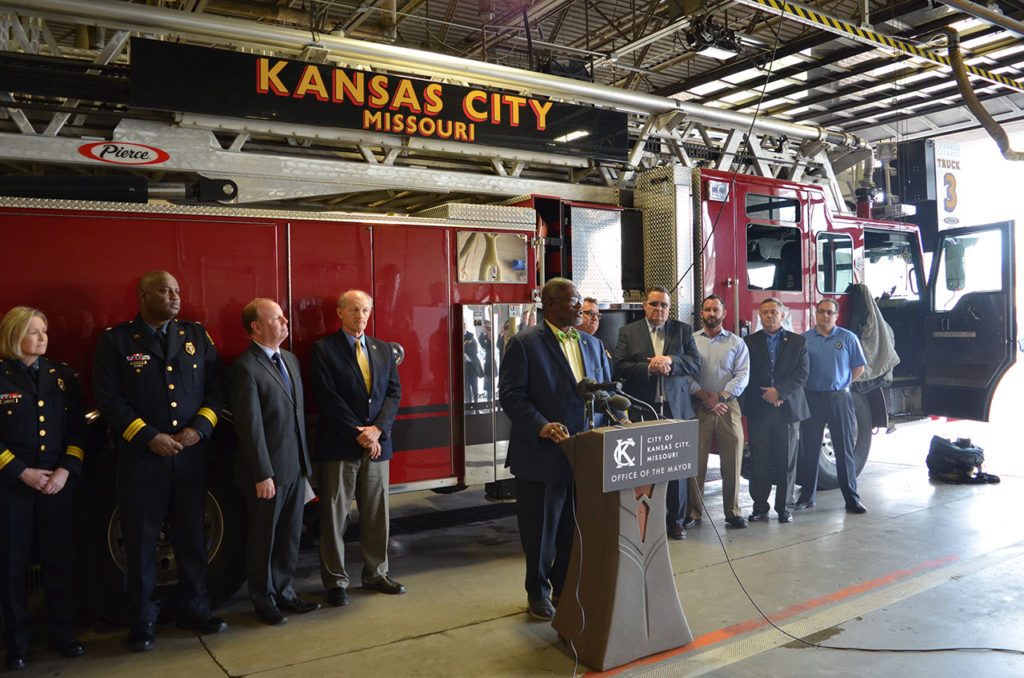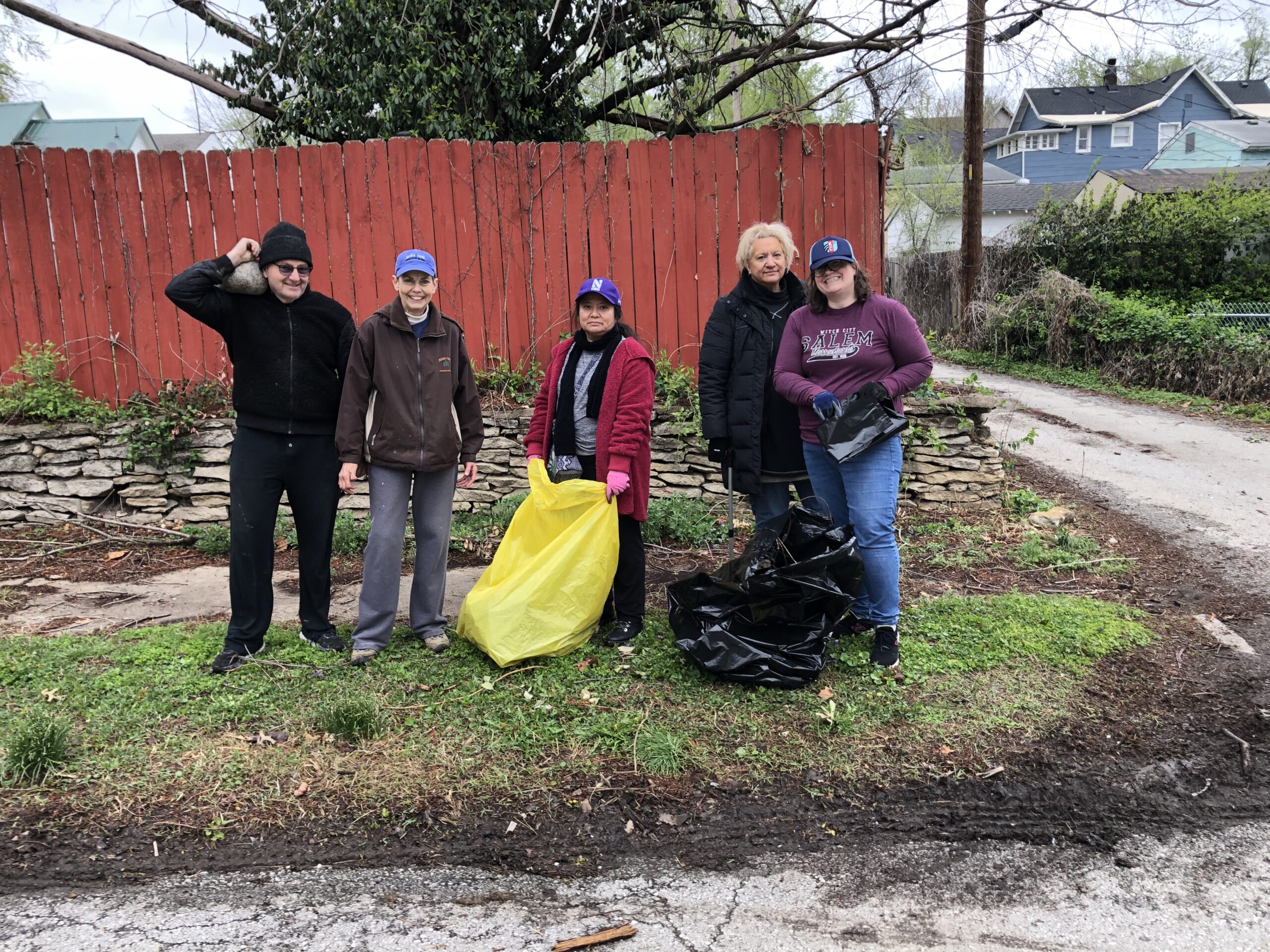By Paul Thompson
Northeast News
Kansas City leaders filed into KCFD fire station #10 in the Historic Northeast on Wednesday, April 11 to issue, of all things, an impassioned defense of sales taxes.
Standing in front of a pristine fire truck – purchased thanks in part to city-issued sales taxes, the message implied – Kansas City, Missouri Mayor Sly James, KCFD Fire Chief Gary Reese, KC Parks and Recreation Director Mark McHenry and Kansas City Area Transportation Authority (KCATA) Director Robbie Makinen defended the city’s local tax rates against the threat of HB 2168, a new bill authored by 105th District State Representative Phil Christofanelli that would cap Missouri’s sales and use tax rate at 14%.
The legislation would take effect on August 28, 2018, and it wouldn’t apply to taxes that are already on the books. However, no additional taxes could be implemented unless other sales taxes are first repealed or allowed to expire. Nowhere in Kansas City, Missouri does the sales tax exceed 14%, but there are areas where the rate is approaching that level. With the legislation still making its way through Jefferson City committees, however, the final threshold isn’t yet set in stone.
When Christofanelli’s law was initially filed, it proposed a maximum sales and use tax rate of 12%. In a conversation with the Northeast News last week, however, Christofanelli acknowledged that his preference would have been to set the sales tax cap even lower.
“I think 10% was good enough for Jesus, it ought to be enough for local governments,” Christofanelli said with a chuckle. “In an effort to not put the cap lower than some places already were, I filed the bill at 12%.”
The lingering uncertainty surrounding the legislation’s tax threshold perhaps explains why, on April 11, city leaders arrived in the Northeast with a preservationist’s mindset.
“It doesn’t really matter where they would cap it,” James said. “The fact that they would cap it at all is a handcuff on us. That’s something that we simply can’t have.”
Newly-minted Kansas City, Missouri Fire Chief Gary Reese defended the department’s 1/4-cent Fire Safety sales tax, which was implemented in 2001, renewed in 2014, and raises nearly $20 million annually.
“Taxes like the Fire Safety sales tax, like all such local initiatives, represent the endorsement of our citizens,” said Reese. “We believe Missouri House Bill 2168 limits and even threatens Kansas Citians’ choice to support their firefighters by allowing us to have equipment, staffing and safety measures we need to respond safely and competently to our citizens’ needs when they call 911.”
Robbie Makinen, CEO of the Kansas City Area Transportation Authority (KCATA), grew passionate while discussing the threat to the city’s transit system that is posed by HB 2168.
“About $58 million comes in that we use every year off the sales tax,” Makinen said. “The State of Missouri gives us just under, I believe, $400,000 a year; that equates, based on our ridership, to between three and five cents a ride.”
Makinen further suggested that a threat to sales taxes that KCATA depends on is a threat to the nearly 16 million Kansas Citians who use the transit system annually. It’s those people, Makinen added, who drive the engine that is Kansas City.
“Everybody in the State of Missouri may not use public transit, but I guarantee you the State of Missouri depends on people every day who do,” Makinen said.
During his time at the podium, Parks and Recreation Director Mark McHenry pointed out that the city’s widely admired World War I Museum – whose doorstep hosted a national centennial event last year – benefitted from a half-cent sales tax approved by Kansas City voters.
“It is now one of the best museums in the country,” McHenry said. “I’m very, very proud of that.”
Funding for the 12,000-acre parks system was also provided through a half-cent sales tax in 2012, which McHenry noted was approved into perpetuity by KCMO voters. Those funds support playgrounds, youth programs, swimming pools and maintenance of parks properties throughout the city.
Ingrid Burnett, the Northeast’s representative in the Missouri House of Representatives, wasn’t at the April 12 meeting but spoke with the Northeast News about HB 2168 later in the week. She suggested that it isn’t a major topic in Jefferson City at the moment, and that she doesn’t anticipate it going too far as presently proposed.
“It’s not a bill I would support,” Burnett said. “It takes away local control, for one thing. These are taxes and costs that we have imposed on ourselves, and it’s insulting, quite honestly, that someone from outside the area thinks that by legislative fiat at the state level they’re going to put that kind of barrier in front of us.”
The impassioned concerns at the city level butt against the defense of the legislation from Christofanelli, who considers his legislation less of a personal affront and more of a philosophical disagreement. To Christofanelli, sales taxes are regressive – meaning that they have a greater impact on low-income residents than the affluent. In that sense, Christofanelli contends, such taxes can serve as a barrier for entry for citizens who struggle financially.
“It’s simply because sales tax rates in the state of Missouri are spiraling out of control,” Christofanelli said of his motivations. “The pushback seems to come primarily from the governments that want to push sales tax above 14%.”
As for the argument that local sales taxes represent the will of the people? Christofanelli suggested that many of those votes take place in low-turnout spring elections in which only one message is delivered to potential voters.
“The only message that the public receives are those that come from the beneficiaries,” Christofanelli said. “Almost all of these tax increases have virtually no serious opposition campaign, because it’s a very difficult thing to raise money for. It’s an unfair event from the very beginning.”
Christofanelli didn’t single out this year’s April 3 election as an example, but it would seem to fit his argument; less than 10% of Kansas City, Missouri’s registered voters turned out to extend the Public Improvements Advisory Committee (PIAC) sales tax, which funds in-district improvements throughout Kansas City’s six council districts. That said, those who did turn out voted overwhelmingly in favor of the extension; more than 75% of voters supported the measure.
To Mayor James, fulfilling the will of those who cast votes in local elections is more important than pursuing the political whims of those who don’t even live in Kansas City. He pointed to Kansas as an example of a state where a culture of slashing taxes led to economic turmoil.
“We’ve got a state next to us that’s tried some experiments in this vein and it didn’t work out at all,” James said. “Why do we want to repeat the mistake that we see right in front of us? It doesn’t make sense.”
















